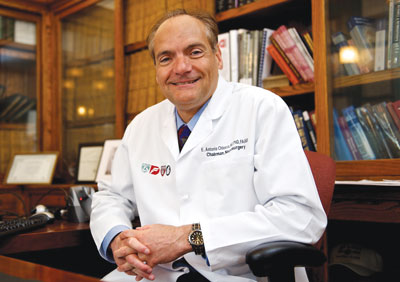Chiocca Shares Goals, Opportunities for Neurosurgery
 |
Neurosurgery Chairman Antonio Chiocca is proud to call BWH home.
|
BWH Communication & Public Affairs sat down with Department of Neurosurgery Chairman Antonio “Nino” Chiocca, MD, PhD, to discuss his goals for the department and reflect on his experiences since joining BWH to lead Neurosurgery last August.
How did you first become interested in neurosurgery?
The first time I saw a video of a brain pulsing, it was love at first sight. Neurosurgery was my favorite subject in medical school. There are so many opportunities for knowledge and discovery when it comes to the brain, which I think is the closest you can get to a person’s soul.
What initially attracted you to BWH?
BWH has the most storied, prestigious tradition in neurosurgery. Dr. Harvey Cushing, the “Father of Modern Neurosurgery,” was the first surgeon-in-chief of [our predecessor institution] the Peter Bent Brigham Hospital, making this the birthplace of modern neurosurgery.
Additionally, the proximity to the Longwood Medical Area and its rich breadth of basic and clinical science - at BWH, Harvard Medical School, the Dana-Farber Cancer Institute, Children’s Hospital and the Mass. General Hospital nearby - attracted me. There is such a rich collaboration among individuals here, all working to provide excellent patient care, discover the cures for tomorrow and enhance our knowledge of disease processes. We have access to the talents and passion of our smart young clinicians and scientists - our problem-solvers. We don’t realize how lucky we are; other places are not like this.
 |
Neurosurgery Chairman Antonio Chiocca catches up with fellow neurosurgeon Edward Laws, MD, director of BWH's Pituitary and Neuroendocrine Center, in the Neurosurgery suite.
|
How would you describe your time as Neurosurgery chairman so far?
It’s been a lot of fun. I’ve been meeting as many colleagues as possible and learning about opportunities for partnership, as well as the challenges they face. I am also establishing my clinical practice and research team. I brought most of my lab - 15 people - from Ohio State with me. They love Boston.
Has anything surprised you about BWH?
The collaboration and cooperation among clinical chiefs and hospital leaders have been very impressive and is very unusual. In other places, leaders can be in competition with each other; not here. There are rules of engagement - of compassion and collegiality - that our community follows. Health care, caring for people, is one of the highest callings we can have, and I think everyone at BWH understands this and works together to achieve it.
What have been the challenges?
I think having the physical space for our programs to grow is the biggest challenge we face. Also, something we’re always thinking about is how to deliver the best care possible and be efficient with our expenses.
What priorities have you been addressing?
We’ve been addressing the institution’s strategic initiatives - patient affordability and care redesign - with two Neurosurgery projects. The first is being led by Kai Frerichs, MD, with Michael Groff, MD, and John Chi, MD, and is related to spinal care and managing spine disease patients, which is one of our biggest populations. The second, led by William Gormley, MD, focuses on improving the cost effectiveness of Neurosurgery ICU care.
It is a big department, so I have many clinical and research priorities, including establishing continued trust and confidence among the faculty and residents and aligning everyone toward the same goals and direction. Working as a team allows us to provide first-class clinical care that is nationally recognized and discover new scientific knowledge.
What has the transition to BWH been like for you?
I have been really impressed by the array of intelligence and know-how of BWH staff, nurses, the ICU teams, physician assistants and everyone else. They truly know and love their patients. There is an approach and a sense of volunteerism here. Sarajune Dagen, RN, is one of the many people who come to mind - she epitomizes that volunteer spirit. In the last blizzard, she truly went above and beyond, staying extra hours and ensuring patients were cared for. She’s an amazing human being.
What goals do you have for the department of Neurosurgery and for Neurosurgery research?
One goal is continued excellence in clinical care. I would like patients to feel confident that there is no reason to go anywhere else for their care. It’s also important and meaningful for us to continue to look for ways to secure research funding and ensure that the academic papers our talented researchers are producing continue to be highly cited.
Can you give us an overview of your research?
One of my research areas is glioblastoma, which is the most common and aggressive brain tumor in humans. I look at the role microRNAs - molecules that help to regulate the expression of multiple genes - play in the process of a tumor’s growth and invasion of the brain. I am also studying how drugs can be used to stop tumor cells from metastasizing and migrating throughout the brain, which is deadly. A third area involves examining how we could use viruses to kill off tumor cells.
Is your family adjusting to life in Boston?
They are. My wife and I have a daughter who is 14 and boys ages 12, 9 and 7. They love Boston so far.
Chairman Chiocca's Favorites
Hobbies: Swimming, jogging, skiing
Book genre: Biographies, history, especially WWI and WWII
Music: Alternative rock, British rock and pop, with favorite bands including Blur, The Kooks, The Cure, The Smiths and Arcade Fire
Father of Modern Neurosurgery's Books Find New Home
In early April, Lawrence Cohn, MD, Hubbard Professor of Cardiac Surgery at Harvard Medical School, donated his collection of books by "Father of Modern Neurosurgery" Harvey Cushing, MD, to BWH's Department of Neurosurgery at an intimate BluePrint-themed gathering.